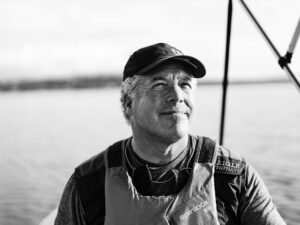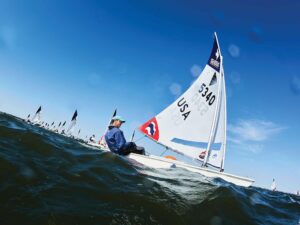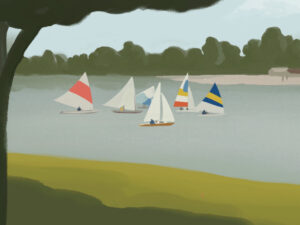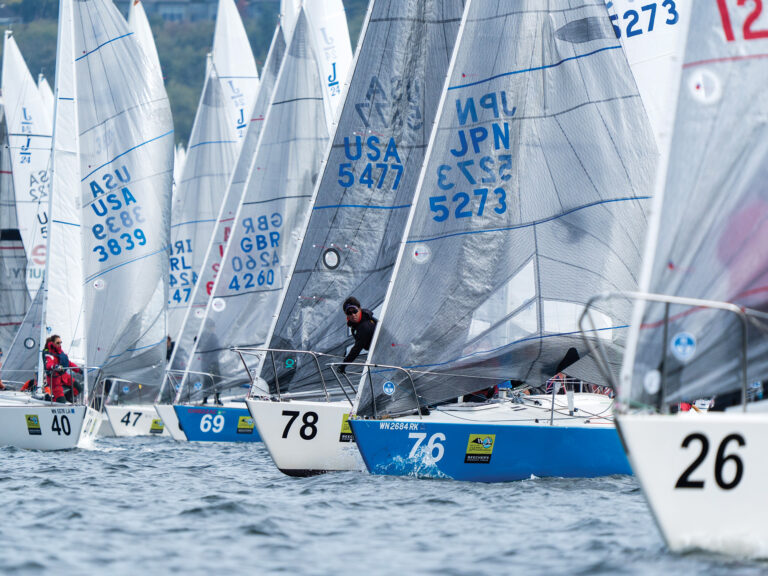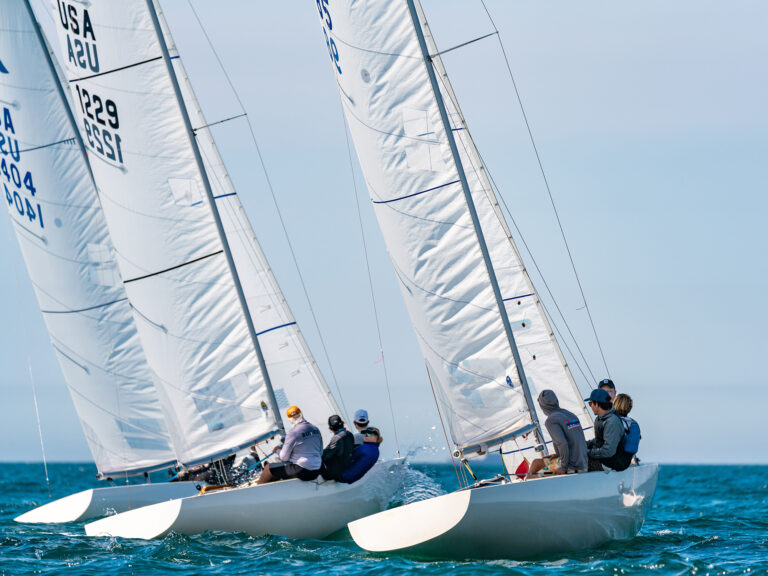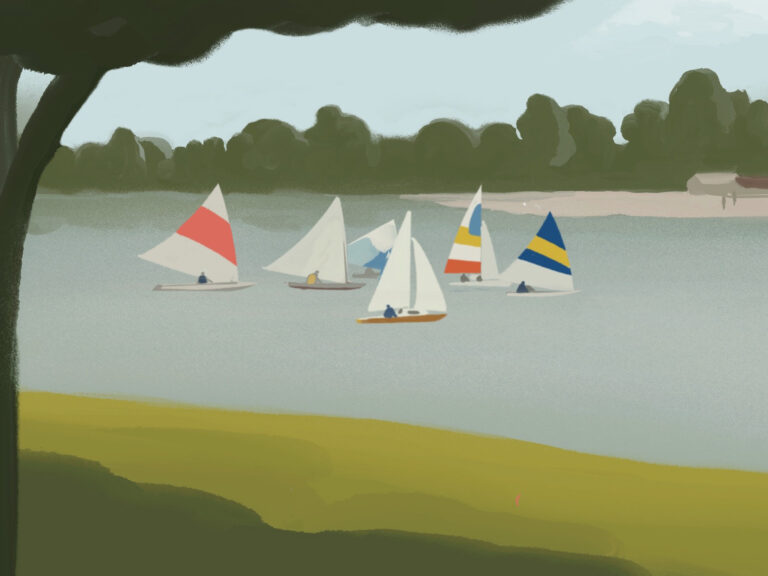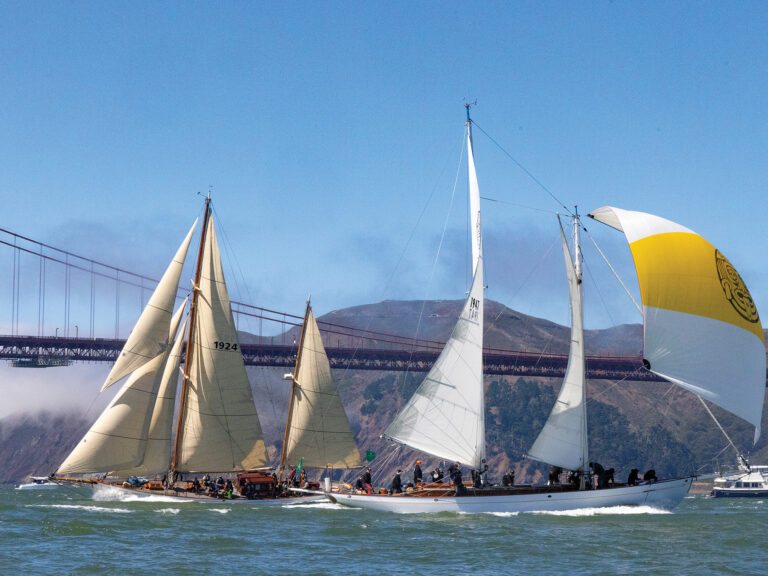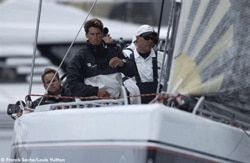
PRESS CONFERENCE TRANSCRIPT
ROUND ROBIN TWO — RACE DAY THREE
Tuesday, 29th October 2002
Bill Trenkle — Stars & Stripes
Mats Johansson — Victory Challenge
Luc Pillot — Le Defi
Matteo Plazzi — Prada Challenge
Thank you Bill for coming. You are one of the most experienced Americas Cup sailor. We all know that Team Dennis Connor was one of the only favourites for the Louis Vuitton Cup.You are not doing so well. Do you know the reason? Three losses in a row?
Bill We were maybe listed as favourites but I think there were about six favourites in there. We always knew this was going to be a tough battle. All the teams were going to be very well prepared and sail very well. We think weve made some small improvements. We know we have a long way to go. We wish we were doing better. But everyones sailing very well out there and unless you sail your very best and make no mistakes you are going to lose some races.
Mats, you have two points today, the only boat with two points today. You are now fourth and looking good. You must be pleased with your new boat is your boat faster than the old one in your training sessions?
Mats Not right now I think but we are pretty happy with speeds upwind but we need to work on the boat to get it faster downwind. Especially today we were not fast enough downwind.
**And you broke a spinnaker sheet today? **
Mats Yes, that was one small accident we had but we need to tune the boat better and drive the boat better downwind too.
**Was it a snapshackle that broke or the sheet itself? **
Mats It was the snapshackle.
**Luc, you were leading ahead of Luna Rossa, it was going to be a good race and then suddenly you lost some ground. You had a problem with your jib, I heard? **
Luc Yeah. In fact I think we had too many problems to be able to fight with confidence against Prada. We had problems with the genoa and then we broke one jumper so we were able to finish the race but it was not easy and we were not able to do the second one. Fortunately we had a good start, we chose the right side, and it was good at the beginning and we were able to take the lead but I think that as with a few races before we didnt make a complete race so we werent able to cross the finish line in front of Prada.
**How did you break the jumpers? **
Luc During a gybe, the backstay was in front of the jumper and when we tied the running backstay with the backstay it broke.
**Can you repair it overnight or will you ask for another delay? **
Luc No, I think we cannot ask for another delay, so we will repair it during the night.
**Bill, what about your incident on board? I know it is a very complicated device, for the sheeting of the jib sheet of those boats, but what did you break? The hydraulic? **
Bill The outboard genoa car track system. Its a system that moves forward and aft and in and out.
**It is quite a complicated piece of equipment. Is it the block itself? **
Bill Its part of the system, the traveller car that broke.
**And you could not repair it on board? **
Bill Well we thought we had it repaired after the first race. We had asked the race committee for some time to try to effect a repair so that we could race the second race. We thought we had it fixed. We sailed upwind and it looked okay. But then when they had a delay because of the first squall, when we started the second sequence it was quite windy 21 knots we were seeing at the top of our mast and when we sheeted on it was quite obvious the repair wasnt holding, it was quite scary that it could have ripped out and hurt somebody on board and done some serious damage so thats when we decided it was better we try to have the umpires to come over and have a look at it before we tried to race with it.
**You know that Oracle is protesting? They just filed a protest. **
Bill I have just seen that.
It will not be heard tonight, but tomorrow. So another incident today Matteo, on Luna Rossa, what happened on the winch?
Matteo We had a couple of problems on the boat today. Unfortunately on the first tack we broke the starboard pedestal of the primary winch. That was a part of the reason why we lost some distance with the French boat. Then during the downwind leg we also broke the transmission between the pedestal and the secondary winches, so we finished the race and once we crossed the line we decided to have an inspection and we showed the evidence that we couldnt fix one of the two breakages on the water.
**Is it easy to repair? **
Matteo Yup, easy to repair in four hours.
**Bill, after you broke or damaged the car system in the first race did you notify the race committee at all that you had a problem at that stage? **
Bill Yes, we did.
To all four people up there – three boats this afternoon couldnt race, which meant that the entire afternoons program was compromised, except for Victory Challenge vs. Mascalzone. Its flat water out there, there was a reasonable amount of wind but it wasnt excessive. Do you consider the challengers to be prepared and fit right now? Or are you surprised by this?
Bill There probably shouldnt be this many breakdowns. We had so few in the first round and its quite surprising to have this many today. But theres obviously something all the challengers have to work on.
**Mats, do you agree? **
Mats Yes, we were lucky, we had one breakdown in the first round robin, when the genoa halyard broke. Of course there are small things sometimes. But we are happy with our boat. It was strong enough to go through two races today.
Luc?
Luc I think on that kind of boat it is always a problem to be able to do the race totally without any damages, especially with that wind. We were sailing with 18-19 knots sometimes, which is quite a limit. I guess the limit is made because those boats are quite difficult to sail with small winds. Today it was surprising to see three boats at the same time. But we didnt have so many problems with the races before. It is something that is going to happen. Maybe we had some matches before I think it was something like 12 matches and today we had some damages but I think its the deal with that kind of boat.
Matteo, you did not suffer many breakages on Luna Rossa before, not even in 1999/2000 – this is new to you?
Matteo Unfortunately it happens that sometimes you have breakages. The reason we didnt see these three races happen is everybody wants to start the race with the boat at 100%. Probably all the boats that had breakages could have finished the race but theres no reason to start the race if you dont feel 100% competitive.
Bill, the inference in the Oracle protest is that you are doing a little bit of gamesmanship and that you killed the race. Seeing as you came off a pretty bad loss this morning from Sweden and the boat doesnt look to be going great in heavy winds, is there any truth to that gamesmanship at all? Youve also been in Dennis campaigns for quite a number of years.
Bill No. Theres no gamesmanship involved. The umpire came over and looked and the measurer came over and looked and saw that we legitimately had a problem. Of course they were anxious to go racing and we were anxious to go racing too. They feel cheated out of having a go but unfortunately thats the way the rules are set up if you cant go and race at 100% you dont have to race. We could have limped around the racecourse but that wouldnt have accomplished much either. They can say what they want but we know what happened. It happened to other boats as well, so they shouldnt be so quick to make comments like that.
**Youre confident the protest will be dismissed? **
Bill Yes.
**To the group, I ask you to reflect on the last few days of non-racing, when the conditions on the racecourse for the most part were actually pretty fair conditions for racing. Would you rather be sailing? Should this business of wind limits be changed in the future? **
Matteo I think the concept of the wind limits started because of how long the series is. One of the ideas behind the wind limit is that these boats are difficult, or dangerous, above a certain amount of wind. Having a competition that keeps going for several months, you have to think about the fleet. So for sure the weather is a factor a lot because of heavy winds and also light winds. But I do agree that we need the wind limits. It is the right number so we probably shouldnt discuss that.
Luc I think the wind yesterday was very strong and it wouldnt have been fair to sail the boats. I want to remind you that the Americas Cup is in February and in February there is less chance of having strong winds. The Challengers decide to have this limit because we dont want to be too rough on the boats during the spring when the challenger meets the defender. I want to come back to the question to Bill. Its quite different when we have two races in a day. When we want to ask for a delay of 45 minutes we dont have to justify it but when we want to postpone or cancel the second race in a day like today we have to explain it to the jury and justify why we ask for this. The jury may come on board. The reason we ask must be for safety or security or a reason for the boat and for the crew so its quite different.
**Mats? **
Mats Yes, we need to look to the future when we come to the Americas Cup to push the boats hard now is not so good. We need to take care of our boats and masts and sails, so that the challengers meeting Team New Zealand are prepared. If we put the limit up higher now I think we would meet them with a weaker team and a weaker boat so I think the limit we have now is ok.
**Bill, with your experience could we sail those boats with a reef or with a blade jib or smaller spinnakers in 25 knots? **
Mats We practice a lot in winds between 20-30 knots but this is just for the crew team but now when we are racing I think the limit is ok.
Bill?
Bill We actually had this conversation a lot the past four or five days, sitting around. What someone pointed out was that the problem is theres no defender series. If the defenders had to race at the same time we had to race it would make it a lot easier to have no wind limits or have higher wind limits because really, theyve said, its equalizing us with the defenders by having these wind limits. Theres three or four sails that we have to carry as it is. We know that we have to sail in 23 knots yeah we only start at 19 but we dont get a ban until 23 knots. So we all have speciality sails that take us up to 23 knots, which I can almost guarantee that Team New Zealand doesnt have to have those sails. We only have a limited number of sails that we are allowed to register for the regatta. All of a sudden you start registering sails that are not going to be used and that takes away from your inventory of really useful sails. Thats one of the things we think about, that creates a situation, is that there is no defender series and the defenders dont have to go out when its windy. And they can keep their powder dry so to speak.
**But do you think sailing those boats in 25-30 knots would mean that the hull would have to be built stronger or just the mast and sails? **
Bill Every component would have to be stronger. Hundreds of kilos to make every component stronger¿its a long series.
So it would be a different boat?
Bill Yeah. Well, a couple of hundred kilos is enough to make one boat slower compared to the other.
**Bill, can you tell us whether Stars and Stripes was exercising a 45 minute delay? Or the second race of the day delay, postponement? **
Bill When we spoke to the jury we said wed like you to come over and inspect us and see whether in your opinion were entitled to a delay to the next day. If not then wed probably request a 45 minute delay.
**So the first choice was to keep your joker effectively for another day, the 45 thing. **
Bill Thats correct.
Bill, you say the defenders wouldnt have to race in a stronger breeze. As I understand it theres no upper wind limit for the Americas Cup¿.
Bruno Theres no wind. Not much wind. Its not a matter of wind limits. During the Americas Cup the wind is normally much lighter.
**But if it was to blow at 20-25 knots what happens then? **
Bill Well typically it doesnt blow 20-25 knots in February.
Bruno Its the race committees call. You can expect that they will not start the race in 25 knots if the boat is not ready to. Next please¿.
**Mr Plazzi, what is your opinion of the speed of the boat le Defi Areva sailing windward? **
Matteo For sure today was not a very good day to measure the speed of the boat as it was quite shifty and puffy. But I think it is competitive and today we both had a race with a handicap. We had problems and they had problems. I think they are competitive and definitely we were not very happy when they were in front and we had to push as hard as we could to win the race.
**Mats, you started Round Robin One with three victories and youve done the same in Round Robin Two. Are you more confident this time that youll finish with more than three and if so why? **
Mats Of course we will try to do that. I was, not really, but a little disappointed after the first round robin when we started with three wins and after that had five losses. But we are better prepared now in the second round robin to take some victories. We trust the new boat and maybe we can take some more wins in this second round robin.
**Matteo, at the halfway of the first leg Luna Rossa suddenly lost one hundred metres in one minute. Was that due to the windshifts or the problem with the winches? **
Matteo We were on starboard tack when we lost the most. We broke the starboard winch, so it was not the problem with the winch. They were in better pressure. Both boats were in the lift and they kept the lift longer than us.

